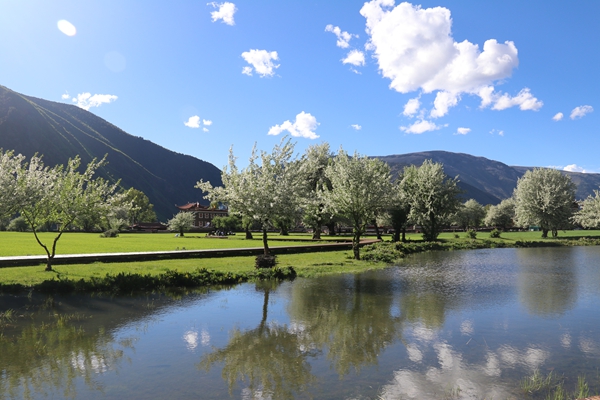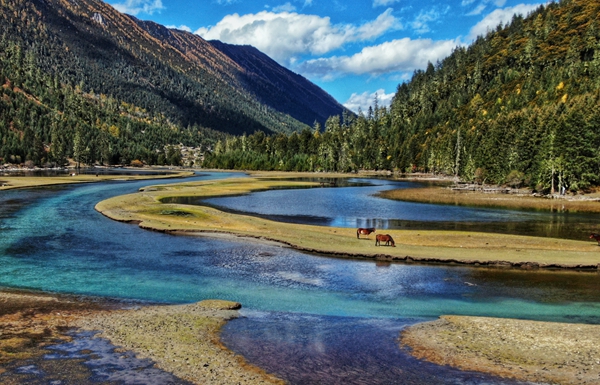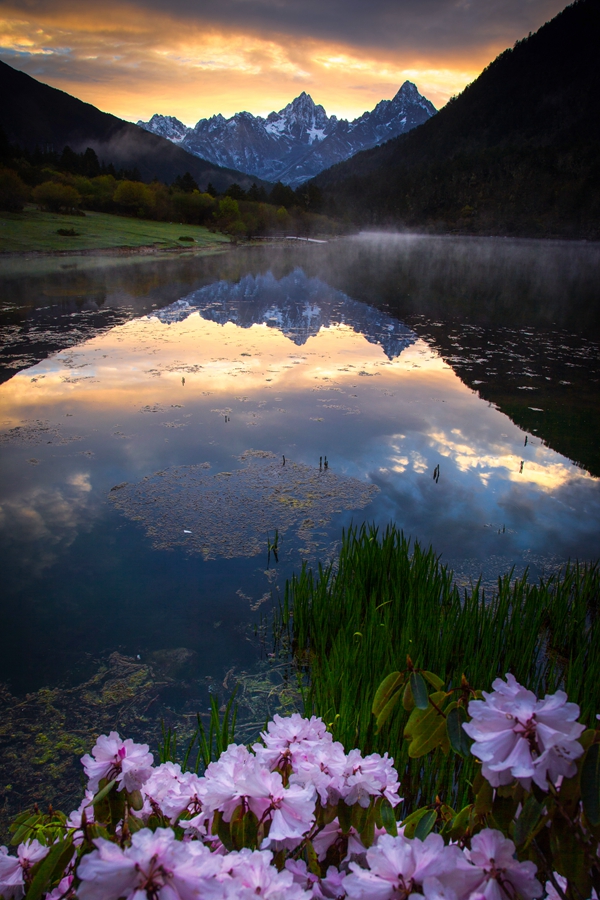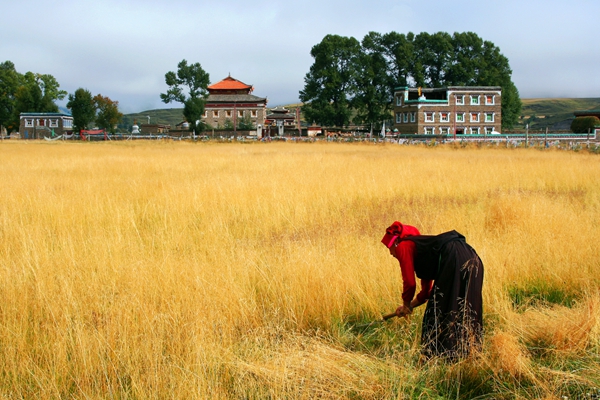
Kangding, capital of Ganzi Tibetan Autonomous Prefecture, in Southwest China's Sichuan Province, is the birthplace of the famous folk song, Kangding Love Song. In addition to its love-song culture, Kangding is known for its time-honored history, ethnic culture and picturesque scenery.
Kangding Love Song
"Horses run on Paoma Mountain. Clouds over there can be seen. The Lees have a good lady. Charming, graceful and shapely …" Many people have gotten to know Kangding through Kangding Love Song, the folk song famous throughout China, and even the world. Kangding Love Song originated from a traditional folk song that was popular among locals around Kangding. The folk song was adapted by Wu Wenji (1918-1966), a singer and composer, when he visited Kangding in the 1940s.

Wu presented the folk song to composer Jiang Dingxian (1912-2000), who composed the accompaniment, based on the original tune, and gave the song its name, Kangding Love Song, in the summer of 1947. In the autumn of that year, Yu Yixuan (1909-2008), the renowned Chinese soprano and music educator, performed the song during her solo concert in Nanjing, in East China's Jiangsu Province.
The song became famous nationwide in 1948, after a recording company, based in Shanghai, produced a record that contained Yu's version of the song. In 1949, Yu sang Kangding Love Song during her solo concerts in Paris, France, and London, the United Kingdom. The song was well-received by the European audiences, and it gradually gained global popularity.
In 1952, a group of young Tibetans performed the song at the Vienna World Youth Festival, and they won the silver medal for their excellent performance. In the 1990s, Kangding Love Song, famous around the world for its beautiful rhythm and rich emotional connotation, was listed by the United Nations Educational, Scientific and Cultural Organization (UNESCO) as one of the world's most influential folk songs.

Kangding Love Song has been performed by numerous singers, in China and in other countries. It is the epitome of the profound and unique love-song culture in Kangding. The first Kangding Love Song Festival, a music festival with love songs as the theme, was held in Kangding in 2001. Since then, the festival has been held every few years, and it has attracted tourists, from home and abroad, and it has boosted the development of both the local culture and local tourism industry.
Picturesque Scenery
Sichuan Province borders Southwest China's Tibet Autonomous Region. As it is located on the Tibetan- Sichuan border, Kangding used to be an important trade center along the ancient Tea-Horse Road, a commercial passage for transporting tea, salt and other commodities.
Since ancient times, Kangding has been the transportation hub and the political, economic, cultural, commercial and information center of the Kangba Tibetan region. It is where numerous ethnic cultures blend harmoniously. Kangding is also one of the main gateways to Tibet from Sichuan Province.

Nowadays, the southern line of the Sichuan-Tibet Highway, as part of the G318 National Highway, is a popular route into Tibet. Many visitors choose to use this highway to enter Tibet, as they can see "four seasons in a day" along the road. The highway, considered one of the most-precipitous roads in China, has breathtaking — and ever-changing — landscapes.
Paoma Mountain, with an elevation in excess of 5,500 meters, is near the G318 National Highway. The mountain is of spiritual importance to Tibetans, who hold a traditional festival on the mountain annually to commemorate the birthday of Buddha.
The Walking Around the Mountain Festival attracts Tibetans from neighboring villages, and they camp on the mountain and participate in wrestling and horse racing. The mountain is also famous across China thanks to its mention in Kangding Love Song.
Ganzi Intangible Cultural Heritage Museum, which opened in 2009 at the foot of the mountain, became the first museum of intangible cultural heritage in an ethnic minority area in China. It displays rich Tibetan culture, such as Tibetan costumes, Tibetan crafts and Thangka art.
The Well is a natural spring in the urban area of Kangding. The spring water comes from the Five- Color Sea, behind Paoma Mountain. In ancient times, the Well was locals' main water source. Now, it is a popular tourist attraction. The locals adhere to the tradition of taking spring water from the Well on New Year's Eve, to express hope for happiness and good luck in the coming year.

Mugecuo Scenic Area, also known as Scenic Spot of Kangding Love Song, is endowed with high peaks, dense forests, clear lakes and vast grasslands.
The scenic area is an important part of Gongga Mountain National Nature Reserve. Dubbed the King of Sichuan Mountains, the 7,556-meter-high Gongga Mountain is the highest peak in Sichuan Province. Snow-covered mountains and healing hot springs coexist there.
Xinduqiao, a small town in Kangding, is one of the must-visit places along the G318 National Highway. It has been hailed as a paradise for photographers, and as a world with lights and shadow. The town has a picturesque corridor that stretches about 10 kilometers. Enthusiasts of photography will marvel at the fabulous natural lights and shadows, and the idyllic landscape of soft clear brooks, golden poplars, snowcapped mountains afar, and the vast grassland, where flocks of sheep and cattle are scattered.
Lotus Sea National Forest Park, situated in Pusharong, a township in Kangding, is a primitive forest park where visitors can experience the original beauty of nature. There are five alpine lakes and more than 10 hot springs in the park. The park boasts lush virgin forests, with lakes surrounded by grasslands, forests and snow-capped mountains.
Photos Supplied by Publicity Department of CPC Kangding Municipal Committee and Wang Yuchuan, Zhaxi Pengcuo, Wang Zhiwei and You Jianzhong
(Women of China English Monthly June 2023 issue)